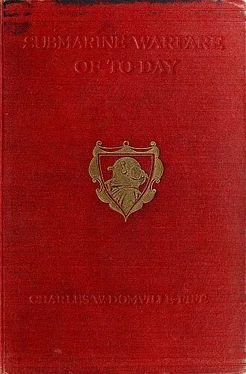Smith lingered a few minutes on deck to finish a cigar before going below for his evening meal. Seldom during the past year had all the elements been so long at peace, and the contrast appealed to him as a luxury to be enjoyed at leisure. Even the light breeze of sunset had died away, leaving an unruffled calm, and the sails and stumpy funnels of the little fishing craft appeared like “painted ships on a painted ocean.”
For nearly an hour he sat inhaling the fragrant and satisfying smoke from more than one cigar, preferring the cool of the deck to the stuffy cabin. Then a dark blot appeared from out of the luminous blueness of the eastern sky and it travelled rapidly downwards towards his flock.
Smith watched it for several seconds, then it suddenly dawned upon him that the hand of the destroyer was coming even into this haven of peace, and a fierce resentment entered his soul. He heard the distant shouting of fishermen as they cut adrift their nets and prepared to scatter before the approaching zeppelin, and in a moment he realised that the long-awaited chance had come. It all seemed too unreal to be true, but he rose up quickly and in a few terse sentences gave the necessary orders for the guns’ crews and engineers.
The whir of the airship’s propellers grew rapidly louder and its bulk loomed black against the bright sky. Determined, however, to take no risk of failure, Lieutenant Smith withheld the fire of his guns until the great aerial monster, now travelling down to less than 1000 feet, was well within range.
Attracted by the helplessness of a large number of fishing craft congregated in a comparatively small area of sea, the destroyer dived to the attack like some giant bird of prey, unable in the gloom which shrouded the earth to distinguish the presence of an armed escort.
The suspense was painful. Then the muzzles of two high-angle guns rose up from the well-deck and superstructure of the armed patrol, and in response to a low-toned order from the C.O., giving the height, time and deflection, they quickly covered the great black body of their objective. Tongues of livid flame leapt from their mouths and were followed by sharp reports. A few minutes of heavy firing and the nose of the monster appeared to sag.
The men at the guns yelled exultantly, redoubling their efforts, and shell after shell went shrieking heavenwards. Suddenly the sea around rose up in huge cascades of foam and a shattering roar, which completely dwarfed the voice of the guns, shook the small ship from stem to stern. Everything movable was hurled across the deck. Breaking glass flew in all directions, and the aerials at the mast-heads snapped and came tumbling down with a mass of other gear. The cries of injured men arose from different parts of the ship, but still the guns hurled their shells, and the zeppelin, now well down by the head, rose high into the upper air and made off eastwards. After dropping all her bombs in close proximity to the armed trawler she had lightened herself sufficiently to rise out of range, but whether or not she would be able to keep up sufficiently long to reach her base, over 300 miles distant, was extremely doubtful.
Flames spurted from the short funnel of the patrol as she steamed at full speed after the retreating zeppelin, endeavouring to keep her within range as long as possible. It was a question of seconds. Before she finally disappeared in the increasing darkness another long-range hit was observed and the zeppelin receded from view, drifting helplessly.
The disappointment at not being able to give the coup de grâce to the aerial destroyer was keenly felt by all on board, for a half success is of little account in the navy. The gunners had done magnificently, the ship had been manœuvred correctly and four of the crew had been wounded by fragments from the bombs dropped en masse , but notwithstanding their exertions and the luck which had brought the zeppelin down from the security of the skies, they had failed to secure the prize legitimately theirs. That the attack on the fishing fleet had been successfully beaten off appeared a minor detail, and the voyage back to port in the quickening light of a beautiful summer morning was a sad pilgrimage. Scarcely a word unnecessary for the working of the ship was spoken, except Lieutenant Smith’s brief explanation that it was just his luck.
* * *
About two weeks later the proverbially “unlucky Smith” was ordered to report at the office of the Admiral Commanding, and he had a sharp struggle to maintain a becoming composure when he heard the terse compliment and the mention of a recommendation from that austere officer, coupled with the intelligence that the zeppelin had dropped into the sea off the coast of Norway.
The spell was broken, and the brisk step and gleam in his dark eyes told their own tale as he walked quickly back to his ship.
CHAPTER XXVI
On the Sea Flank of the Allied Armies
It is a mere truism to say that the sea outflanks all land operations in warfare. Yet how many people fully realise that the left wing of the Allied armies in Belgium and France depended for its safety on the naval command of the North Sea and English Channel? Had this sea flank been permanently penetrated or forced back by the German fleet, the result must have been disastrous to a large section of the Allied military line, which actually extended from the North Sea to the Mediterranean.
Although the security of the North Sea flank did not entirely depend upon the naval forces based on Dover, Dunkirk and Harwich—as all operations, whether on land or sea, were overshadowed by the unchallenged might of the Grand Fleet, which hemmed in the entire German navy—it was upon these light forces, largely composed of units of the new navy, that the brunt of the intermittent flank fighting and the repeated attempts by the enemy to break through—with the aid of all kinds of ruses and weapons—was borne for four and a half historic years.
The detailed story of their work on the Belgian coast and in the Straits of Dover could only be told in a separate volume, but the following account of a bombardment and its sequel may not be without interest here. Its relevance to anti-submarine warfare lies in the fact that the bombardment was carried out with the object of destroying the nests of these under-water craft established in and around Zeebrugge. Much that has also been said in former chapters bases its claim to inclusion in this book almost entirely on the fact that although it did not deal exclusively with submarine fighting or minesweeping, it nevertheless formed part of the daily operations of the anti-submarine fleets, and no account of their work would bear any resemblance to the actual truth in which such seemingly extraneous episodes were excluded as irrelevant.
The Bombardment and its Sequel
There was a flat calm, with the freshness of early summer in the air. Zeebrugge lay away in the darkness some fifteen miles to the south-east—awake, watchful, but unsuspecting—when the British bombarding squadron steamed in towards the coast to take up its allotted position and wait for daybreak.
It was a heterogeneous fleet, screened by fast-moving destroyers, torpedo-boats, trawlers, M.L.’s and C.M.B.’s. The great hulls of monitors loomed black against the paling east, and the long thin lines of destroyers moved stealthily across the shadowy sea. No lights were visible, and only the occasional rhythmic thud of propellers and the call of an awakened sea-bird broke the stillness of the morning calm.
The sky was not yet alive with the whir of seaplanes, and the air remained undisturbed by the shattering roar of guns and shells. It was that brief space of time in which even Nature seems to hold her breath and make ready for the coming storm. The only movement other than the continued circling of destroyers was towards the shallow water close inshore, where powerful tugs were towing large barges—flat-bottomed craft carrying gigantic tripods made of railway metals. At predetermined places these were dropped overboard into the shallow sea and, with their legs embedded in the sandy bottom and their apices towering high above the surface, they formed observation platforms from which, in conjunction with aerial scouts, the fire of the big ships could be accurately directed on to the fortifications ashore.
Читать дальше












